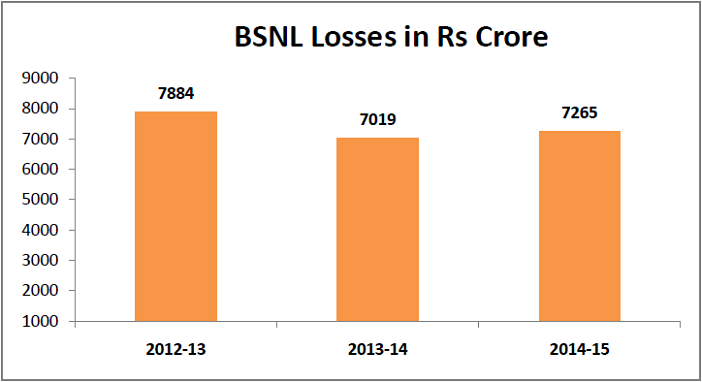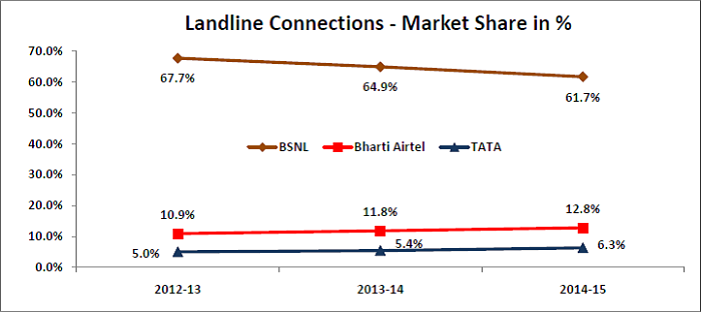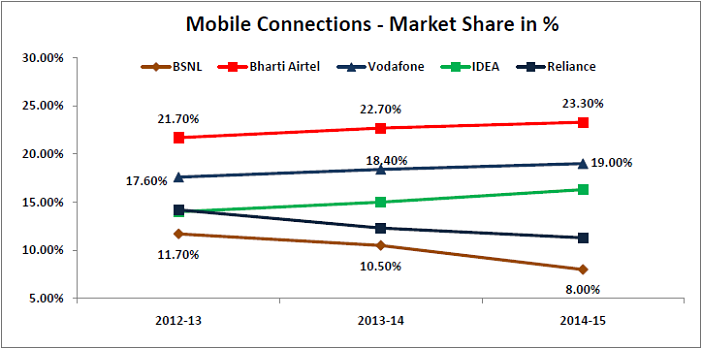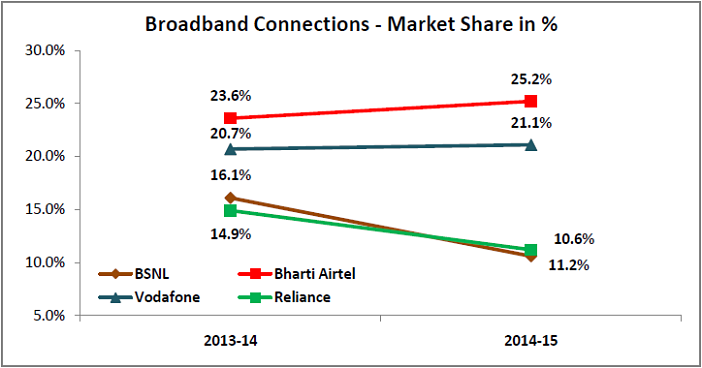[orc]The State owned Telecom major Bharat Sanchar Nigam Limited (BSNL) has been on the downslide for quite some time now. It is losing both revenue & market share to private players. While reasons are many, its inability to invest in infrastructure & promotion has costed it dearly. It is losing market share every year and accumulating losses.
The state owned Bharat Sanchar Nigam Limited (BSNL) provides services to 98% of the villages in the country through its Village Public Telephone (VPT). No other Telecom Service Provider can even come close to that number. Notwithstanding these numbers, the state owned BSNL is on the downslide without any sign of recovery. Over the last few years, it has been losing both money & market share in all telecom services (Landline, Mobile & Broadband).
BSNL in continuous losses
BSNL made a loss of 7265 crore rupees in 2014-15 compared to the 7019 crore loss it made in 2013-14. The losses in 2012-13 were 7884 crore rupees.
BSNL was in profit of 5977 crore rupees in 2003-04 and continued to remain in profit till 2008-09. But things started changing after that. The revenues are declining because of decreased market share and increasing expenditure. According to the Government, BSNL has been unable to invest in expansion of its network over the period 2009-2013.

Declining Market Share
BSNL has been losing its market share in all the three domains (Landline, Mobile & Broadband). Landline has been BSNL’s mainstay all these years. Even here, it is slowly losing ground to private players like Airtel & TATA. From more than a 2/3rd market share (68%) in 2012-13, the market share has come down to 62% in 2014-15.
In the Mobile connections domain, BSNL has always been playing catch up with private players like Airtel & Vodafone. While both these private players have been increasing their market share every year, BSNL has been losing its share of this market. From 11.7% in 2012-13, its share is down to 8% in 2014-15. During the same time, Airtel increased its market share from 21.7% to 23.3% while Vodafone’s market share also went up from 17.6% to 19%. Few other private players like Reliance & TATA also lost their market share while Idea increased its market share.
In broadband also, BSNL’s market share went down from 16.1% in 2013-14 to 10.6% in 2014-15, a decline of more than 30%. Going with the trend in other domains, both Airtel & Vodafone increased their market share. Airtel currently holds 1/4th of the share in the broadband space.
Losing Customers & Quality
In the last four years alone, BSNL has lost close to 78 lakh landline customers & 6.5 lakh mobile customers. If this loss alone is not enough, BSNL also ranked low on the Quality of Service (QoS) parameters and benchmarks laid down by Telecom Regulatory Authority of India (TRAI).
TRAI has laid down the Quality of Service (QoS) parameters and benchmarks for both landline and mobile telephone service. TRAI has been monitoring the performance of service providers, against the quality of service benchmarks for the various parameters through Quarterly Performance Monitoring Reports. The performance on call drop is accessed through two parameters viz. call drop rate (benchmark ≤ 2%) and worst affected cells having more than 3% drop (benchmark ≤ 3%).
As per the performance monitoring report for 2G services, for the quarter ending March 2015, the performance of BSNL is poor in both downtime & call drops. For 3G services for the quarter ending March, 2015, the performance of BSNL is poor in call drop.
Government’s Reasons
Government sources cite reasons like power supply problems, disruptions due to cable cuts arising from road development works, breakdown of cables due to old legacy network of basic service, cable theft etc as the reasons for loss in market share leading to the loss in revenue.
As per the government, the reasons for decline in mobile connections are mainly due to inadequate investment leading to network coverage issues, inability to compete with private sector on the customer services and marketing.
What is it doing to arrest the downslide?
According to the Government, BSNL has been taking the following steps to arrest the downslide. It is taking the following steps to address quality issues and attract customers back into its fold.
- Augmentation of its mobile network as part of its Phase-VII Project to create additional capacity of 15 million lines at an estimated cost of Rs. 4804.77 crores. This will result in addition of 14421 2G sites and 10605 3G sites across the country.
- Replacement of the entire network of wire line local exchanges by Internet Protocol (IP) enabled exchanges and deployment of Next Generation Network (NGN) equipment based on the latest architecture gradually to replace entire legacy telephone exchanges at an estimated cost of Rs. 600 crores.
- Migration of entire C-DOT (Centre for Development of Telematics) legacy telephone exchanges with technology solutions being developed by C-DOT at an estimated cost of Rs.350 crores for which MoU (Memorandum of Understanding) has been signed between C-DOT and BSNL.
- Government has assigned the work of providing mobile connectivity in 2199 identified locations in Left Wing Extremism (LWE) affected areas through BSNL at an estimated cost of Rs. 3567.58 crores.
- Government has assigned the work of providing mobile connectivity to uncovered villages in Arunachal Pradesh and two districts of Assam to BSNL on nomination basis at an estimated cost of Rs. 1975.38 crores.
- Monitoring of the Fault Repair Service System.
- Deployment of modern and state of art CDR (Call Detail Record) based Billing & Customer care system.
- Establishment of Customer Service Centers at all important locations in the country with “single window concept” to facilitate friendly interactions with the customers.
- Replacement of weak batteries and power plants to improve network uptime
- Regular Radio Frequency (RF) optimization tests.
BSNL is augmenting 15 million lines and expanding its mobile network progressively to enhance coverage capacity and to further improve the Quality of Service (Qos).
Steps to attract Customers
BSNL has also taken the following initiatives to attract customers.
- Unlimited free night calls from landline to any network between 9pm to 7am.
- BSNL is the only operator in India which is offering free incoming calls to its customers while roaming on pan-India basis.
- BSNL is offering reduce call rate during first three months to new customers. The reduced call rates are only Rs. 0.50 per minute and 0.8 paisa per second for all type of outgoing calls for per minute plan and per second plan respectively.
- BSNL is offering data Special Tariff Vouchers (STVs)
- BSNL in partnership has built public Wi-fi infrastructure for provision of Wi-fi services (speed up to 20Mbps). Till June, 2015 BSNL has launched Wi-fi services at 78 Hotspots at 17 locations across 6 cities.
Is this enough?
To compete with private players that spend a large chunk on promotion, BSNL also should promote its products aggressively while working on enhancing quality. It has been spending less than 0.5% of its revenue in advertising while private players spend a lot more than this. While the CMD of BSNL is confident of getting BSNL back to the green by 2018-19, it looks highly improbable for now.






1 Comment
There is no doubt that BSNL has been on a slide. most of it is attributed to the Raja era which purposefully got this telecom behemoth to underperform. Not allowing them to buy equipments to other problems things were made very difficult for BSNL. they lost in the voice growth from 2008-2009. however it looks that things are getting better. it will be some time for this to come back to profit but at least they have starated posting operational profit from this year. Remember that BSNL and Air India are the 2 big behemoths who contribute more than 50% loss from PSUs. even if the loss can be contained it will help a lot for the government who keep on subsidizing these. For telecom, it is important that government has a presence. Even today, BSNL rates are very low in comparison to private players. what they need is proper equipment with less or no delay from government. Unlike AirIndia the staff in BSNL is much more motivated. if corruption is contained, i won’t be surprised if this unit comes up profitable in next 2-3 years. this will give a much needed competion to the private players.